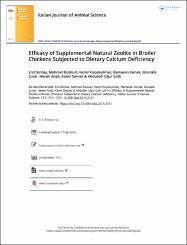Efficacy of supplemental natural zeolite in broiler chickens subjected to dietary calcium deficiency

View/
Access
info:eu-repo/semantics/openAccessDate
2014Author
Bintaş, ErolBozkurt, Mehmet
Küçükyılmaz, Kamil
Konak, Ramazan
Çınar, Mustafa
Akşit, Hasan
Seyrek, Kamil
Çatlı, Abdullah Uğur
Metadata
Show full item recordAbstract
Natural zeolite, or sodium aluminosilicate, influences calcium (Ca) and phosphorus (P) utilisation in chicks. A 2x2 factorial arrangement of treatments was used to investigate the effect of dietary Ca (recommended and below recommended levels) and zeolite (0 and 0.8%) on growth, plasma, tibia and faeces in chickens from 1 to 42 days of age. Zeolite supplementation did not affect overall body weight (BW) gain, feed intake (FI) or feed conversion ratio (FCR) of broiler chickens (P>0.05). Overall mortality of zeolite-fed chickens was lower than in untreated ones (P<0.01). Reduction of dietary Ca of approximately 10 to 18% decreased (P<0.05) BW at 14 and 42 days of age in association with reduced FI, but overall FCR was unchanged. Serum protein and sodium constituents were reduced in birds fed zeolite (P<0.05). Decreasing dietary Ca level increased (P<0.01) serum, total protein and glucose concentrations, but decreased Ca level. Zeolite decreased bone ash in birds fed a Ca-deficient diet while increased faecal excretion of ash, Ca. P and aluminum. However, zeolite increased tibia weight (P<0.05) and thickness (P<0.01). No significant response (P>0.05) in relative weight and gross lesion scores of liver or footpad lesion scores was found related to changes in dietary regimens.
The results of the present study do not corroborate the hypothesis that the effectiveness of zeolite may be improved in Ca-deficient diets in association with its ion exchange capability.

















